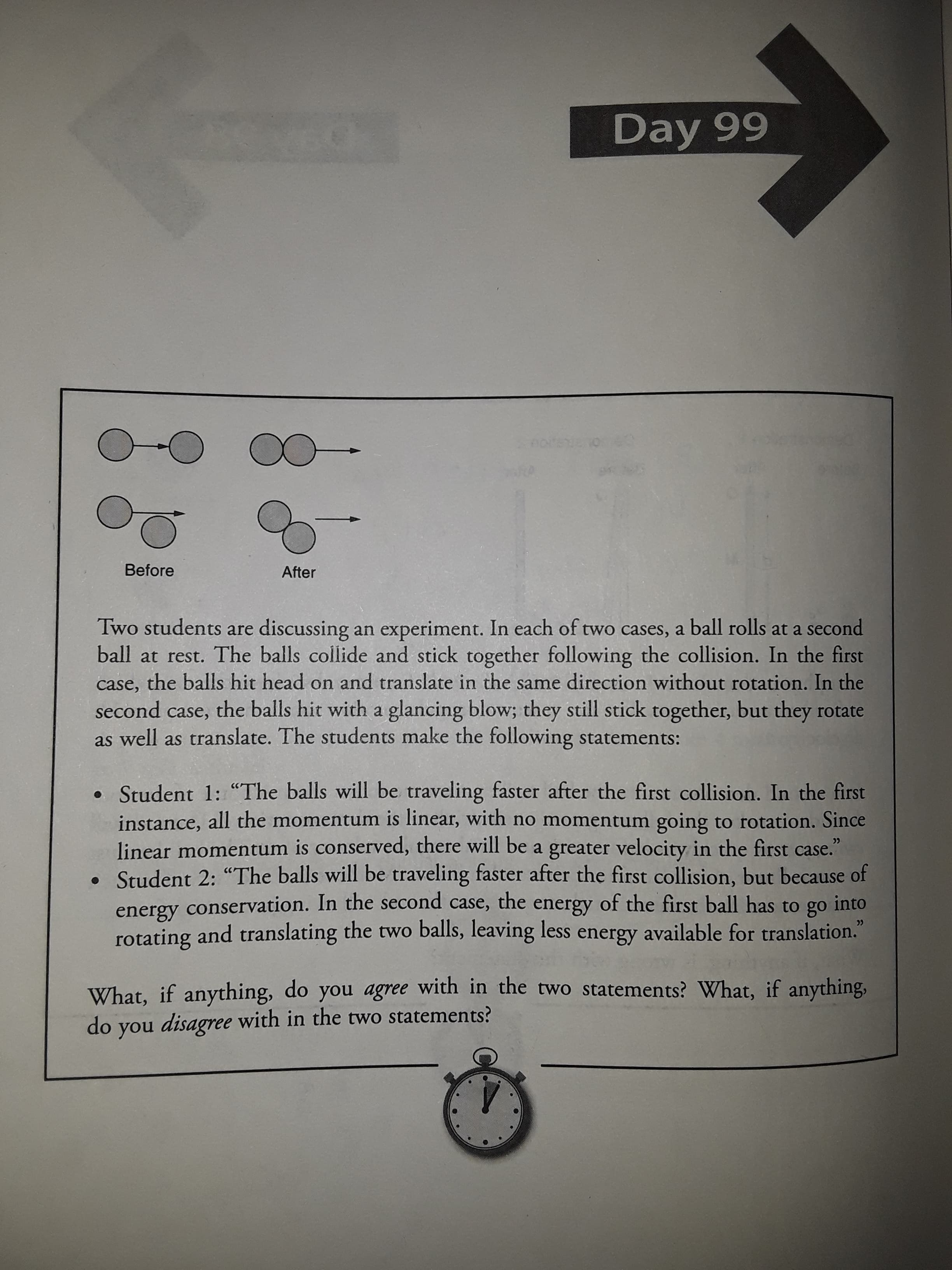Day 99 00 Before After Two students are discussing an experiment. In each of two cases, a ball rolls at a second ball at rest. The balls collide and stick together following the collision. In the first case, the balls hit head on and translate in the same direction without rotation. In the second case, the balls hit with a glancing blow; they still stick together, but they rotate as well as translate. The students make the following statements: • Student 1: "The balls will be traveling faster after the first collision. In the first instance, all the momentum is linear, with no momentum going to rotation. Since linear momentum is conserved, there will be a greater velocity in the first case." • Student 2: "The balls will be traveling faster after the first collision, but because of the energy conservation. In the second case, energy of the first ball has to go into rotating and translating the two balls, leaving less energy available for translation." >> What, if anything, do you agree with in the two statements? What, if anything, do you disagree with in the two statements?
Day 99 00 Before After Two students are discussing an experiment. In each of two cases, a ball rolls at a second ball at rest. The balls collide and stick together following the collision. In the first case, the balls hit head on and translate in the same direction without rotation. In the second case, the balls hit with a glancing blow; they still stick together, but they rotate as well as translate. The students make the following statements: • Student 1: "The balls will be traveling faster after the first collision. In the first instance, all the momentum is linear, with no momentum going to rotation. Since linear momentum is conserved, there will be a greater velocity in the first case." • Student 2: "The balls will be traveling faster after the first collision, but because of the energy conservation. In the second case, energy of the first ball has to go into rotating and translating the two balls, leaving less energy available for translation." >> What, if anything, do you agree with in the two statements? What, if anything, do you disagree with in the two statements?
Principles of Physics: A Calculus-Based Text
5th Edition
ISBN:9781133104261
Author:Raymond A. Serway, John W. Jewett
Publisher:Raymond A. Serway, John W. Jewett
Chapter11: Gravity, Planetary Orbits, And The Hydrogen Atom
Section: Chapter Questions
Problem 56P
Related questions
Topic Video
Question
How do I solve this? How do I determine the different velocities if I don't know what kinds of momentum are conserved?

Transcribed Image Text:Day 99
00
Before
After
Two students are discussing an experiment. In each of two cases, a ball rolls at a second
ball at rest. The balls collide and stick together following the collision. In the first
case, the balls hit head on and translate in the same direction without rotation. In the
second case, the balls hit with a glancing blow; they still stick together, but they rotate
as well as translate. The students make the following statements:
• Student 1: "The balls will be traveling faster after the first collision. In the first
instance, all the momentum is linear, with no momentum going to rotation. Since
linear momentum is conserved, there will be a greater velocity in the first case."
• Student 2: "The balls will be traveling faster after the first collision, but because of
the
energy conservation. In the second case, energy of the first ball has to go into
rotating and translating the two balls, leaving less energy available for translation."
>>
What, if anything, do you agree with in the two statements? What, if anything,
do you disagree with in the two statements?
Expert Solution
This question has been solved!
Explore an expertly crafted, step-by-step solution for a thorough understanding of key concepts.
This is a popular solution!
Trending now
This is a popular solution!
Step by step
Solved in 4 steps with 3 images

Knowledge Booster
Learn more about
Need a deep-dive on the concept behind this application? Look no further. Learn more about this topic, physics and related others by exploring similar questions and additional content below.Recommended textbooks for you

Principles of Physics: A Calculus-Based Text
Physics
ISBN:
9781133104261
Author:
Raymond A. Serway, John W. Jewett
Publisher:
Cengage Learning

Physics for Scientists and Engineers
Physics
ISBN:
9781337553278
Author:
Raymond A. Serway, John W. Jewett
Publisher:
Cengage Learning

Physics for Scientists and Engineers with Modern …
Physics
ISBN:
9781337553292
Author:
Raymond A. Serway, John W. Jewett
Publisher:
Cengage Learning

Principles of Physics: A Calculus-Based Text
Physics
ISBN:
9781133104261
Author:
Raymond A. Serway, John W. Jewett
Publisher:
Cengage Learning

Physics for Scientists and Engineers
Physics
ISBN:
9781337553278
Author:
Raymond A. Serway, John W. Jewett
Publisher:
Cengage Learning

Physics for Scientists and Engineers with Modern …
Physics
ISBN:
9781337553292
Author:
Raymond A. Serway, John W. Jewett
Publisher:
Cengage Learning

University Physics Volume 1
Physics
ISBN:
9781938168277
Author:
William Moebs, Samuel J. Ling, Jeff Sanny
Publisher:
OpenStax - Rice University

Physics for Scientists and Engineers: Foundations…
Physics
ISBN:
9781133939146
Author:
Katz, Debora M.
Publisher:
Cengage Learning

Glencoe Physics: Principles and Problems, Student…
Physics
ISBN:
9780078807213
Author:
Paul W. Zitzewitz
Publisher:
Glencoe/McGraw-Hill